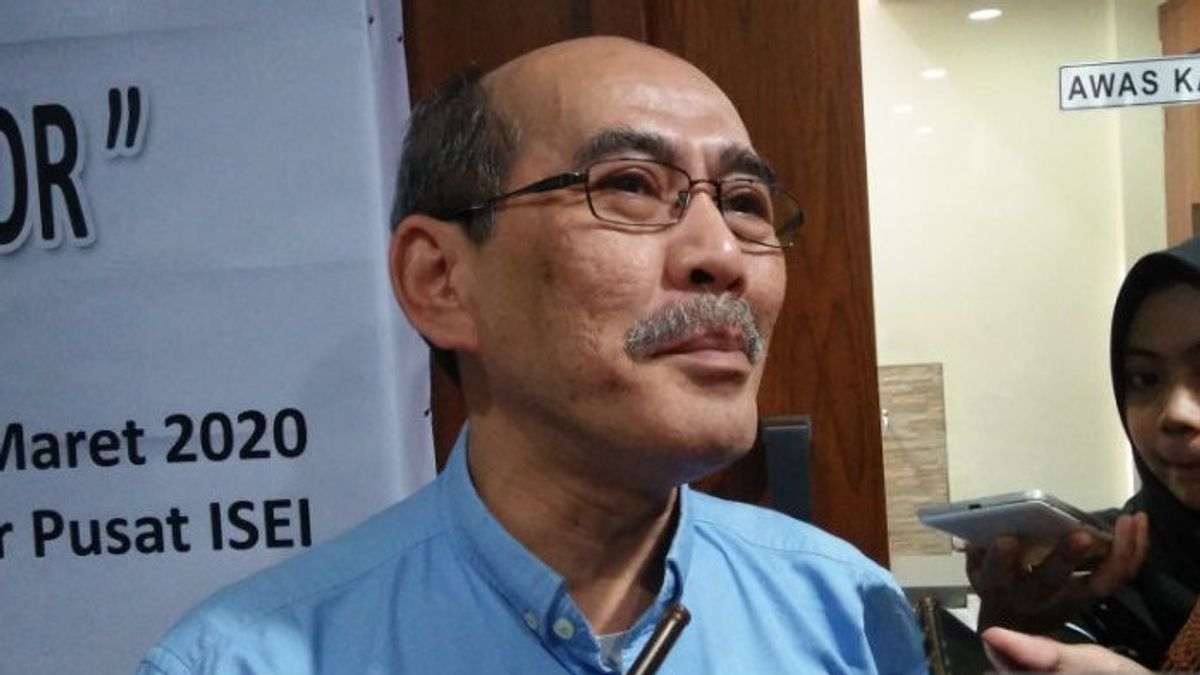JAKARTA - INDEF Senior Economist, Faisal Basri said he hoped that the Omnibus Law on Job Creation, which was recently passed, could be canceled. This is because, the product is considered defective.
"If I expect this (Job Creation Law) to be canceled by the Constitutional Court. Because this is rotten stuff, the contents are rotten, the intentions are rotten. So we have to fight the rottenness," he said, in a virtual discussion, Tuesday, December 8.
Faisal also admitted that he did not believe in the derivative rules of the Work Creation Omnibus Law. He considered, the derivative rules would not be better.
"So there are a lot of congenital defects from in the womb to birth. Many people say okay, we will monitor the PP, how the derivative will be good, if the parent is bad. Impossible. I personally will continue to fight," he said.
Furthermore, Faisal hoped that the proposed formal review of the Job Creation Omnibus Law could be accepted by the Constitutional Court. By doing so, the broomstick law which the government considers to be able to bring investment into Indonesia can be canceled.
"Friends are optimistic, there is a formal test at the Court and a material test. Now the formal test is likely to pass. Because the material test is long because there are many articles," he explained.
According to Faisal, if the judicial review filed against the Omnibus Law on Cipta Kerja is rejected by the Constitutional Court, this could create devastation for the legal system in the country.
"If it is really rejected, the submission for a judicial review is actually a ruin for our legal system. So it will not be possible to make rotten eggs want to eat good? Not so. So we continue to fight," he said.
Low Wage PoliticsFaisal assessed that the Job Creation Law applied low wage politics. This is because the government focuses on creating labor-intensive jobs.
"So to attract investors, Indonesia is labor-intensive, has lots of workers, UMP is not raised happily. So, the government is currently implementing cheap wage politics," he said.
According to Faisal, this was admitted by President Joko Widodo (Jokowi) himself. Jokowi stated that the Job Creation Law was intended to encourage the creation of labor-intensive jobs.
According to Jokowi, the need for employment is urgent because Indonesia has 2.5 million new working age residents, then 6.5 million unemployed as a result of being in the middle and 3.5 million workers affected by the pandemic.
In addition, as many as 87 percent of the workers have an education level of SMA or below.
"The president said that most of our workers are elementary school graduates, so it is necessary to encourage the creation of new jobs, especially in the labor-intensive sector. So, the government is clearly choosing cheap wages politics," he said.
As is known, the Omnibus law of the Employment Creation Law was officially effective since November 2, 2020 after Law Number 11 of 2020 was signed by President Joko Widodo. After the law was enacted, the labor alliance consisting of the Confederation of Indonesian Workers Unions (KSPI) and the Confederation of All Indonesian Workers Unions Andi Gani (KSPSI AGN) also officially registered a judicial review lawsuit or judicial review of the law with the Constitutional Court (MK).
"The registration of the JR lawsuit (judicial review) of the Job Creation Law No. 11/2020 was officially registered this morning with the Constitutional Court in the case file acceptance section," said KSPI President Said Iqbal through a written statement, Tuesday, November 3.
Previously, the KSPI and KSPSI AGN were about to register the lawsuit yesterday during a labor demonstration. However, the number of the law has not been issued so the lawsuit can not be officially registered.
In a KSPI press release, this Tuesday, Said stated that his party rejected the law because it was declared detrimental to workers.
Article 88C Paragraph (1), for example, states that the governor is obliged to set the provincial minimum wage and Article 88C Paragraph (2) states that the governor can set the district / city minimum wage with certain conditions. This article is considered to return workers to a low wage regime.
In addition, the related law is also considered to be detrimental to workers because of the provisions on PKWT or Lifetime Contract Employees, lifetime outsourcing, and reduction in severance pay.
In addition, Said asked the DPR to immediately issue a legislative review of the law.
The English, Chinese, Japanese, Arabic, and French versions are automatically generated by the AI. So there may still be inaccuracies in translating, please always see Indonesian as our main language. (system supported by DigitalSiber.id)













